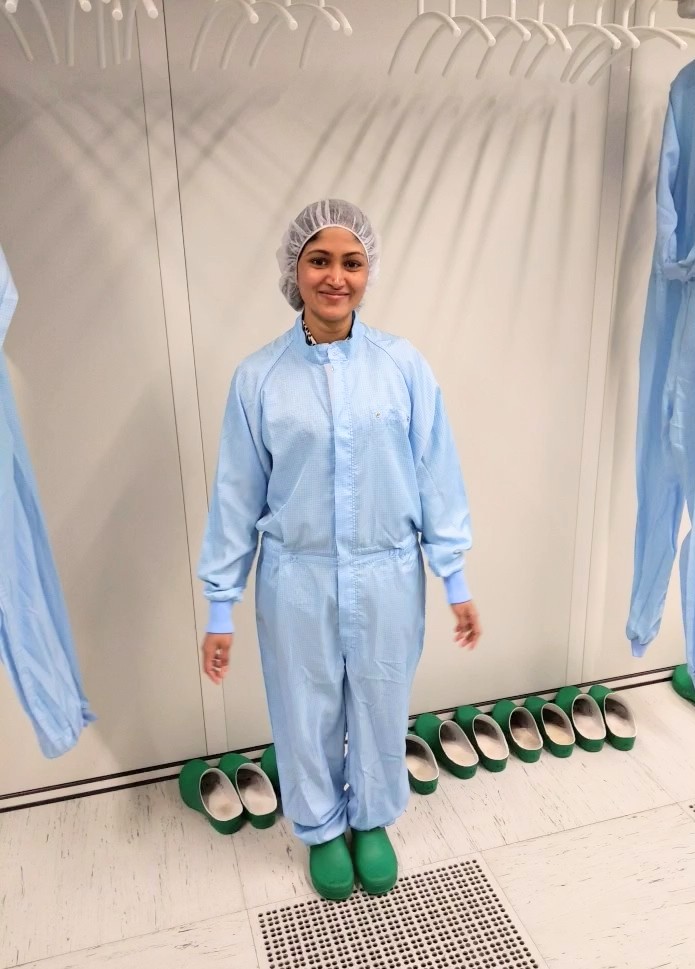Member Profiles
When hidden figures are revealed, it’s worth the wait for Harini Hapuarachchi
Experts at playing the long game, Dr Harini Hapuarachchi and her colleagues at RMIT University are taking the art of professional patience to the next level.
As an Exciton Science Research Fellow, Harini’s work involves theoretically modelling the interaction between excitons and plasmons, and investigating how plasmonic fields can be exploited to control excitons.
For a theorist who draws on her knowledge of physics, mathematics, and programming to solve complicated questions, there’s rarely a standard operating procedure for Harini to revert to.
And it’s the quest to uncover new knowledge that motivates her to solve seemingly intractable problems.
“I'm always fascinated by the finished product,” she said.
“Finding out things that I never imagined that I would a few years back. If I go back and tell my past self that I would achieve this in a couple of years’ time, she probably wouldn't believe that.
“The path in between, that's extremely difficult. You'll have to think for days to figure out the steps that you have to take.
“There's no recipe when it comes to research, so it's about figuring out something from scratch, including a problem that someone has never, ever done before. It's very unpredictable, but it's nice to be able to do that.
“[Fortunately] there's lots of support. We have our collaborators, we have our mentors and supervisors. It's very difficult, but very intellectually rewarding.”
In 2022, Harini received a first-hand reminder of the importance of persistence when seeking to prove bold and imaginative theories correct.
“I was one of three Australian representatives at the 13th HOPE Meeting for Nobel Laureates, and it was mentored by Professor Barry Barish,” she said.
“He was one of the three founding leaders of the Laser Interferometer Gravitational-Wave Observatory (LIGO) project. It was a huge collaboration of about 1,000 scientists that detected gravitational waves.
“That was about 100 years after [Albert] Einstein theoretically predicted [the existence of gravitational waves], so that gives me some hope that theorists will predict things and it could take time for experimentalists to prove those things actually exist.
“If it's okay for Professor Barish and Einstein to play the long game, it's okay for us too.”
Harini is also inspired to excel by the example of science’s famous women, whether that’s in person or on the big screen.
“The other mentor [at the HOPE Meeting] was Professor Donna Strickland, the third woman ever to win the Nobel Prize in physics, and it was lovely meeting her.
“I [also] like to read about and watch biopics on scientists, especially female scientists like Marie Curie and Katherine Johnson.
“She worked on the project where they sent the first American to orbit the earth. She did all the math by hand, and there was a lot of breaking of stereotypes in the segregated America involved in that story.”
Having previously worked in software engineering, Harini is open to returning to industry in the future.
For now, though, she is following her dreams of further academic success, with another positive influence close to home in the form of her supervisor, Exciton Science Chief Investigator Jared Cole.
“I aspire to be like Jared someday, if I have the chance,” she said.
“I'm so grateful to have the opportunity to work under him. There's so much to learn from him. He really empathizes with his team. He knows what our struggles are, he's there when we need him, but he never micromanages at work. He trusts us to get our work done.
“The other thing I really appreciate is he trains us to communicate our science well.”
Finally, Harini knows the importance of positive networks – personal and professional – when it comes to achieving your goals.
“A strong support system (both at home and work) comes in handy when navigating tough times in research,” she said.
“I've been extremely lucky in this regard. So, I'm grateful to my wonderful family (my husband, parents, and brother), supportive research groups and kind supervisors both present and past.”
There's no recipe when it comes to research, so it's about figuring out something from scratch, including a problem that someone has never, ever done before.”

Harini Hapuarachchi
Exciton Science Research Fellow
RMIT University